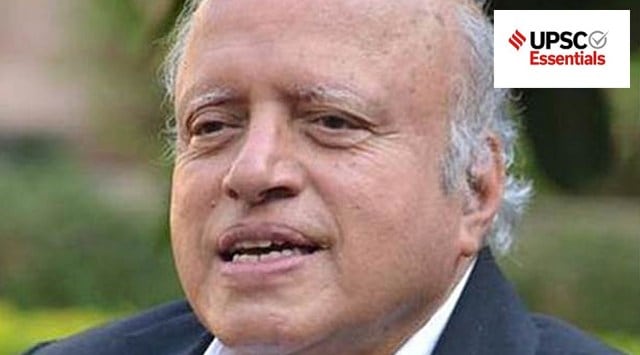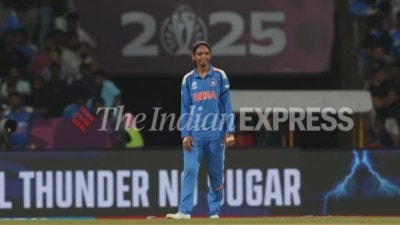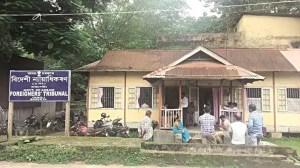M S Swaminathan, hailed as the father of India’s Green Revolution, passed away Thursday. He was 98. He was undoubtedly one of the greatest visionaries that our country has ever produced. He was widely respected for his effective role in sustainable development, advocacy of environmentally sustainable agricultural practices and efforts towards sustainable food security.

How has Dr M S Swaminathan been described at the global level?
The United Nations Environment Programme (UNEP) has described Dr Swaminathan as “the father of Economic Ecology ”. He is one of the three from India to be included in Time Magazine’s 1999 list of the 20 most influential Asian people of the 20th century, the other two being Mahatma Gandhi and Rabindranath Tagore.
Just before receiving the Nobel Prize in 1970, Norman Borlaug wrote to Swaminathan: “The Green Revolution has been a team effort and much of the credit for its spectacular development must go to the Indian officials, organizations, scientists, and farmers. However, to you, Dr Swaminathan, a great deal of the credit must go for first recognizing the potential value of the Mexican dwarfs. Had this not occurred, it is quite possible that there would not have been a Green Revolution in Asia.”
What factors played an important role in shaping his life?
Mahatma Gandhi played a big role in shaping Dr Swaminathan’s personality. He was influenced by ideas of non-violence, Swadeshi and Poorna Swaraj. He was also strongly influenced by the strong moral character and work ethic of his parents. His father was an ardent follower of Gandhi and young Swaminathan was once taken to a rally in which British cloth was burnt – a lesson that the boy would never forget.
Story continues below this ad
From his early childhood, Swaminathan interacted with farmers. He had seen the suffering of his family and other farmers due to fluctuations in the price of crops, weather uncertainties, pests, etc. His family wanted him to study medicine but something changed his mind. During the Bengal famine and Second World War, he saw food shortages and decided to dedicate his life to a mission that India should never fall short of food. He, therefore, chose a career in agriculture and joined Coimbatore Agriculture College. While doing extension works in Coimbatore, he felt convinced that persons toiling in the fields know their job better than a scientific expert and hence it is better to trust the judgment of farmers.
There was also a time when Swaminathan, under family pressure, appeared for the Civil Services Examination. He was selected to the Indian Police Service (IPS). At the same time, he got an opportunity for a Unesco fellowship in the Netherlands in genetics. His mission for life and compassion for his field made him choose genetics. He also earned his PhD from the University of Cambridge. After completing further studies at Wisconsin University, he refused the offer of a prestigious professorship. On asking why he did that, he said, “I asked myself, why did I study genetics? It was to produce enough food in India. So I came back.” Such was his determination towards his goal and passion for the country that nothing could persuade him otherwise. A true patriot!
How did Swaminathan’s values and ethics get translated into his work?
Swaminathan wanted to develop new and improved varieties of seeds, better farming methods and better soil and water management for his country. His larger goal was to take the best of science and technology to the mostly illiterate rural masses that depended on agriculture not only for food but also for employment and income. He had seen the miseries of farming communities while growing up.
Story continues below this ad
Swaminathan found that overpopulated India was importing a vast amount of grain. He felt that importing food was akin to importing unemployment. This was despite the fact that 70 per cent of the country’s population was employed in agriculture. We were supporting farmers in another country. In 2005 he said, “I am firmly convinced that hunger and deprivation can be eliminated sooner than most people consider feasible, provided there is synergy among technology, public policy and social action.”
When he had an opportunity to work at an international level on a wide range of problems, he was able to show his skills in leading consensus and decision-making, building organisational structures and networking of organisations. In 1999, he introduced the concept of trusteeship management of biosphere reserves.
He implemented the Gulf of Mannar Biosphere Reserve Trust with financial support from the Global Environment Facility (GEF). Following the 2004 Indian Ocean earthquake, he advised India to plant new mangroves along the shoreline to minimise damage from future tsunamis. Dr Swaminathan used his skills in genetic engineering and his powers of persuasion to make famine an unfamiliar word in Asia. His high-tech inventions changed not only the continent, but the world as well.
How pragmatic is Dr Swaminathan and how did he use technology to change lives?
Story continues below this ad
Swaminathan’s approach to his work has been quite pragmatic. He keenly observed the pitiable conditions of fishermen and farmers and witnessed how they were at the mercy of natural calamities. He chose villages one by one as his pilot projects and found innovative ways to use information technology to change the lives of villagers. He established a minimalist communications network to make their lives comfortable. He took the help of the internet, email and weather forecasts with ocean wave reports with the result that farmers and fishermen at several places are now more comfortable. Getting people to believe in technology and improving lives using it has been his life’s mission.
What can be seen as Dr Swaminathan’s philosophy of life?
For finances, Swaminathan does not rely on the government. Most of the funding comes from the prize money he has been awarded for scientific achievements. Swaminathan’s life has been influenced by Lord Birkenhead’s saying that an ounce of practice is worth more than a pound of percept. This has been the philosophy of his life. He believes that progress is overcoming chronic social illness. In order to overcome challenges, appropriate blends of political will and action, social mobilisation and technology development, and dissemination of knowledge should be promoted.
What lessons can one learn from his life?
Dr M S Swaminathan is a great visionary, ideal administrator, successful innovator, determined leader and a charismatic institution builder. He studied genetics because he wanted to help poor farmers. He wanted to make it possible for India to produce enough grain to feed people. His compassion towards his mission and his scientific approach have helped him convert his dream into reality. Love for his country and the will to serve his countrymen topped everything else, even leading him to ignore a promising academic career in the US. His life teaches us that passion, commitment, determination and hard work can make our dreams come true.
Story continues below this ad
Subscribe to our UPSC newsletter and stay updated with the news cues from the past week.


































